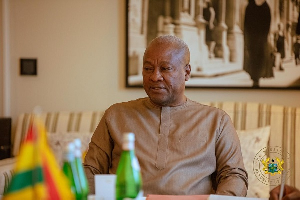Network of NGOs express concern on issues impacting on Development
Tamale, July 21, GNA- The Network of Civil Society Organisations operating in the Northern Region has called on the government to clarify its directive to heads of basic schools not to demand any school fees from parents as from next September. This follows the government's release of 113 billion cedis to District Assemblies to cater for the school fees of pupils under its Fee Free Basic Education.While commending the government for the implementation of the policy, the Network questioned whether the 30,000 cedis per child would be enough to cater for all their needs in a term, such that no school head should collect any extra- fees?.
The Network expressed these concern among others at a press conference held in Tamale on Wednesday.
Mr. Ismail Lansah, Executive Secretary of Northern Ghana Network for Development (NNFD) said that the issue needed to be carefully considered to enable the Ministry of Education to come out with realistic directives to avoid any confusion in relation to the payment of basic school fees in the near future.
He also appealed to government to clearly define the concept of what a Module Secondary School was to avoid the proliferation of new structures being put up in the districts as "module schools."
Mr Lansah said the present definition of a module school was vague as it only describes the concept as having a type of the "Achimotas and Manfansipims" in every district of the country.
He said there was the need to know the standards of teaching and learning facilities required to make a school a module one to avoid the proliferation of such schools in the system.
On the National Health Insurance Scheme, Mr Lansah said the Network was unhappy about the slow pace at which the scheme was been implemented and suggested that, if it was not possible for the scheme to cover every Ghanaian then it should be implemented in phases, starting from groups such as the Ghana National Association of Teachers (GNAT), the Ghana Registered Nurses Association (GRNA), the Civil Servants Association (CSA) and the Teachers and Educational Workers Union (TEWU). He said the current delays in the implementation of the scheme was frustrating workers whose Social Security contributions had already been deducted for its facilitation.
Mr Lansah said another area of concern to the network of Civil Society organizations was the poor water supply situations in the Northern Region were the guinea worm infestation is on the increase.
He said a recent participatory evaluation by citizens on the quality of water supply and sanitation in six districts of the North revealed an abysmal performance of agencies responsible for both urban and rural water supply due to the apathy and communication gap between the service providers and the communities. Mr Lansah said the Network of Civil Society Organisations working in Northern Ghana had taken pains to draw the attention of government to these issues because, "NGOs are to supplement government in its development efforts and not to carry the entire burden of development." He said some people readily hide behind the saying that, "after all there are a lot of NGOs operating in the North- what are they doing", forgetting that such assumptions go to suggest that the area has been neglected, hence the need for NGOs' intervention.
Mr Lansah was of the view that, now that much of support from the donor communities was being channeled through the government through the Multi- Donor Budget Support System, NGOs had been urged to shift the dwindling donor resources into capacity building of the citizens to demand their fair share, saying, "It may be a more sustainable development strategy."
He said the Network had started sensitising citizens at the grassroots not to continue to remain passive recipients of donor and NGO support but to know how to hold government and other service providers responsible and accountable for their basic social needs.
















